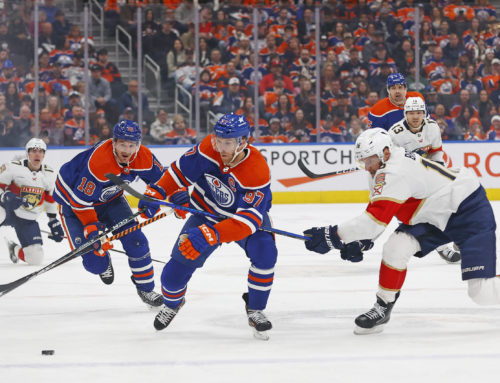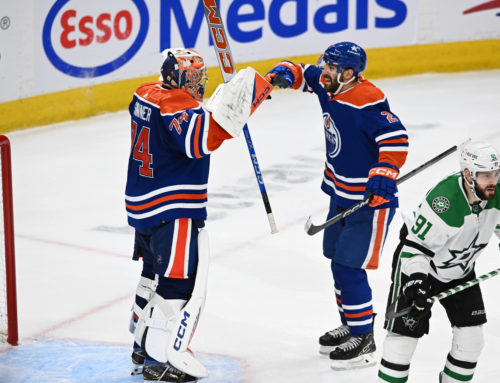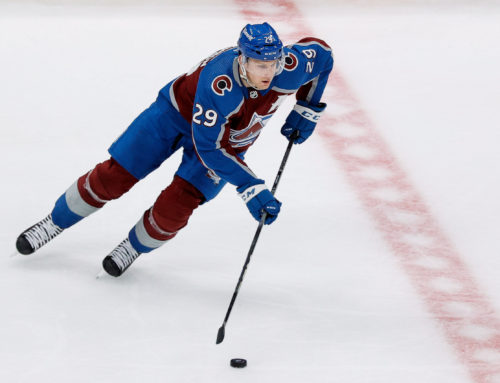
Dobber Investigates the role of advanced statistics in fantasy hockey
Elliotte Friedman posted a column Wednesday night on the increased use of advanced metrics in the NHL. In it, he opines that different teams have been using their own statistical measuring tools for the last several years, not just for evaluating how to use players, but how to pay them. Advanced stats are also starting to play a role in fantasy hockey.
Although there will probably never by a fantasy league that awards points for “Corsi” or “Qual Comp”, advanced statistics can be used to get a better handle on the quality of player that you are investigating. But the tightrope that fantasy owners must walk is finding that balance. How much stock do you put into these metrics? If you lean on them exclusively, you will suffer – mark my words. But if you ignore them completely, you will fall behind your fellow GM’s.
From Friedman’s post:
Oakland A’s general manager Billy Beane, the hero of Moneyball, blamed his team’s playoff failures on “luck.” That’s a cop-out.
Actually, it’s not. It’s an excuse, but a legitimate one. Luck is not a “copout”, it’s a variable that can’t be measured. And it’s a negative influence more than a positive one. All the analysis in the world can put together a great team, but it can’t measure an injury. Or a coaching mistake. These metrics can help you with the odds and the probabilities, but really that’s all they are – odds and probabilities. And unless those odds are 1/1 and the probability is 100%, the method will never be foolproof.
I received my degree in statistics in 1997, with a minor in mathematics. And although much of what I learned has long since been forgotten, there is no denying that numbers interest me and statistics fascinate me. But, thanks to my training, I have a firm understanding of what stats mean and what their limitations are. I understand the importance of sample size and the randomness of certain variables. The average Joe does not.
“Statistics are like a lamp post to a drunk: Useful for support but not for illumination” – Brian Burke
Burke’s not right…but he’s not wrong, either.
Advanced stats give you a probability based on past performance. But as for using them as a future predictor, there are many weaknesses. They represent a measure of what could be done – not what will be done.
It is impossible to measure all of the outside factors that come into play. These are rarely taken into account by amateur statisticians who constantly fall back on advanced stats when arguing the merits of a player. Factors include:
1. Coaching. This includes:
i. Ice Time. All the stats in the world can tell you how great this player is, but if he’s not put on the ice for more than six minutes a game, he’s not going to pan out in fantasy hockey.
ii. PP Time and special teams in general. Getting on the first power-play unit versus not seeing any power-play time at all could mean the difference between 45 points and 65 points in a season.
iii. Does the player even play the game? If the roster is healthy, some very capable rookies and journeymen wind up in the press box. You can stick a piece of paper in front of the coach’s face outlining Player X’s beautiful Corsi rating or low PDO statistic…but do you think he’ll care?
iv. Linemates. I always refer to Steve Sullivan’s time in Toronto. Advanced stats were prevalent back then, but you could just see that he was a talented and productive hockey player. I’m sure if you could look at the advanced stats, they would look pretty sweet. But he played a lot of hockey with Kris King and Tie Domi…so the production was disappointing. What if he got through waivers back in 1999? I’ll tell you what would have happened – he’d be an AHL journeyman, like so many Keith Aucoins. But he didn’t get through waivers, Chicago claimed him. And he went on to post 64 points in 73 games and never looked back.
***Note: get the latest line combinations – free – right here ***
v. Coaching Philosophy. Advanced stats may say that Craig Smith will improve his numbers significantly as this season moves forward, but chances are he will never be anything close to a point-per-game player in a Barry Trotz system. Not even a 0.80 point-per-game player.
2. Luck. This includes:
i. Injuries. I don’t need to expand on this one.
ii. A single mistake. Example – zigging when he should have zagged, costs the team the game and puts the player in the doghouse. The event itself isn’t luck, but rather a lapse of judgment on the player’s part – which in itself is a skill (or lack thereof). However, the timing is luck. How the opposition responds to the mistake is luck. If they miss the net, perhaps all is forgiven.
3. Intangibles. This includes:
i. Heart. Find me an advanced stat that measures this?
ii. Clutch Performance. To measure this, you almost need to break off important games from regular games and analyze the advanced stats therein. A lot of players, over a large sample size, would boast the same numbers. Some players would actually decline for the bigger games. And some players – it’s easy to guess who – would see a bump in their advanced stats.
4. Scouting. This includes:
i. evaluation of skating
ii. evaluation of effort
iii. evaluation of strength
iv. evaluation of shot
v. evaluation of defensive responsibility
If a scout feels that Player X can’t skate, or is too small, then he’ll never get a proper opportunity at the NHL level and it doesn’t matter what his Relative Corsi number is.
Craig MacTavish said it best in Friedman’s article:
“If you rely solely [on analytics], you do it at your own peril. Nobody’s figured out a fail-safe method, not in baseball, football, hockey or soccer. But you’re foolish not to be [looking at them], either.”
As advanced statistics become more widely accepted and more widely used, their impact as a predictor will increase. Right now, the impact of advanced stats as a predictor helps – but is much closer to “nil” than many think. You can evaluate how good a player is in certain situations, but what good is that if the coach doesn’t agree with you?
Use these metrics to back up your argument, or your beliefs. But use them the same way you would use other numbers, such as “goals”, or “ice time”. If you spend too much time and put too much emphasis in possession numbers and zone starts, you’ll make yourself look foolish. It’s a balance. Don’t lose sight of the big picture.
If you do this “balancing act” right, then with each passing year the (let’s say) 10% edge that advanced stats give you will become 20% because coaches are starting to buy in. From Friedman’s article we see that Boston, Dallas, Edmonton, Tampa Bay, Vancouver and Washington are already using advanced stats in some capacity. When all 30 teams use them, the value to poolies will increase. But advanced metrics will never be 100% accurate. And thank goodness for that because we’d all have to quit fantasy hockey.
Follow me on Twitter – @DobberHockey





 EDM
EDM FLA
FLA BUF
BUF DAL
DAL MIN
MIN UTA
UTA NSH
NSH VAN
VAN OTT
OTT DET
DET SEA
SEA
